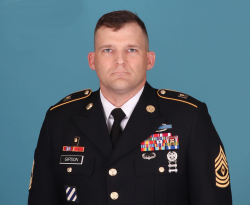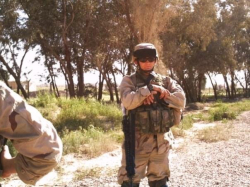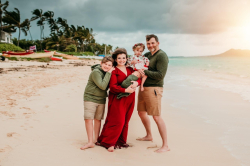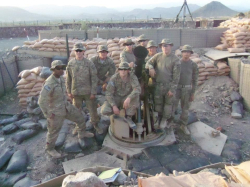Sharing Lessons Learned in Afghanistan
PROVO, Utah – Aug 18, 2022 – During his early career in the United States military, Master Sergeant Wesley Gipson served multiple deployments to Iraq and Afghanistan under the harshest and most demanding of circumstances. At the time of his deployments, Gipson could not have predicted that he would later share what he learned from those experiences with young cadets as the newest senior military science instructor at the BYU Marriott School of Business.
Growing up, serving in the military wasn’t what Gipson was focused on as he woke up at 5 a.m. every morning to milk the cows and feed the chickens on his family’s farm in Dahlonega, a small town in Georgia. During the summer months, he worked in the hay fields, cut down trees, and took on small projects with his father. During the fall and winter months, he attended school. As he neared high school graduation, Gipson couldn’t see past the rolling green hills of his childhood, but he didn’t envision himself as a farmer either.
As he thought about what his next step would be, however, Gipson contemplated his father’s service in the United States Army Special Forces back in the 1960s. “I became intrigued by the thought of doing the same,” he says. Gipson decided to meet with a recruiter for the army, who helped him apply to the United States military.
Shortly after graduating from high school in 2004, Gipson reported to basic training in Fort Benning, Georgia. His career took off shortly after he completed training, when he deployed four times in seven years to locations in Iraq and Afghanistan. During this time, he helped transition units of soldiers to other posts and completed operations in hot, brutal, demanding conditions.
“During my time in Afghanistan, I remember indirect fire and rocket-propelled grenades firing at us every day,” recalls Gipson. “In terms of chaos, danger, and gunfire, it felt as if I was in the Wild West.”
Like many returned soldiers, Gipson struggles with traumatic memories associated with his deployments. To deal with the aftershocks of active duty, Gipson turns to outlets such as attending the gym, hiking, or fishing with his family. “My wife, Kristen, became the rock of the family,” he says. “Through all of my deployments, she’s held everything down at home. She’s absolutely amazing.”
After his deployments, Gipson reported to assignments at Colorado State University’s Reserve Officers’ Training Corps (ROTC) and Pacific Pathways, where he aided in creating partnerships with the Australian, Fijian, and Indonesian armies. He also served in Hawaii in the First Battalion, 27th Infantry Regiment, as a headquarter and headquarters company first sergeant, responsible for preparing more than 200 soldiers and their families for deployment.
Throughout his career, Gipson has learned to always be on the lookout for friction points. “When serving in the military, one needs to constantly anticipate the next move,” he explains. “By avoiding friction points—future problems or danger—it ensures safety and avoids unnecessary conflict.”
While Gipson has spent much of his time traveling to various exotic locations with his wife and three children, his next assignment brings him to Provo. Starting in fall 2022, Gipson will assist in the training of young cadets in the BYU Army ROTC. Aside from adjusting to the presence of mountains, a different climate, and the lack of coffee on campus, he and his family look forward to this next assignment.
“The overall lesson I hope to teach these young cadets is understanding the battlefield and realizing one’s surroundings,” Gipson concludes. “When a student plans an attack during field exercises, I hope they learn not only how to conduct one but to always understand that when things don’t go exactly as planned, you never give up and keep moving forward.”




Media Contact: Chad Little (801) 422-1512
Writer: Sophia Shafkalis



